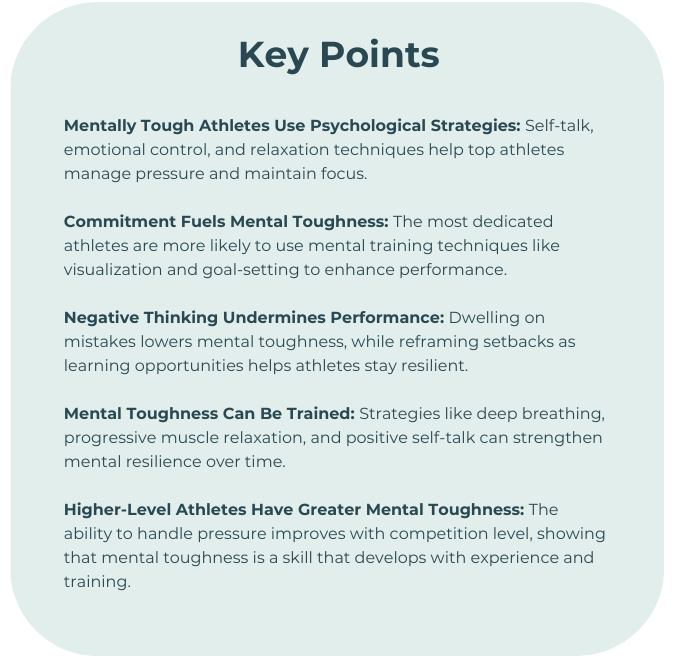Mental Rehearsal Techniques for Athletes: Enhancing Performance and Resilience
What to Consider When Reading
How do elite athletes use mental skills to stay focused and confident under pressure?
What mental training strategies can you implement in your own sport to improve performance and resilience?
Mental toughness is often seen as the invisible edge that separates great athletes from good ones. It’s what helps competitors stay focused under pressure, bounce back from setbacks, and push past their limits. But is mental toughness something you’re born with, or can it be developed through training and psychological strategies?
Recent research sheds light on this question. A study by Crust and Azadi (2024) examined the connection between mental toughness and athletes’ use of psychological performance strategies. The results? Mentally tough athletes don’t just rely on raw talent or physical ability—they actively use specific mental skills to enhance their performance. Here’s what the research reveals and how you can apply it to elevate your game.
1. The Mental Edge: What Sets Tough Athletes Apart?
The study found that athletes with higher levels of mental toughness were more likely to use self-talk, emotional control, and relaxation strategies—both in practice and competition. These psychological tools help them maintain composure, manage pressure, and stay focused on their goals.
Try this: Next time you feel overwhelmed before a game or training session, use self-talk to boost your confidence. Instead of thinking, I’m not sure I can do this, reframe it to I’ve trained for this, and I’m ready to perform. Research shows that positive self-talk reduces anxiety and enhances performance.
2. Commitment: The Key to Mental Toughness
One of the biggest predictors of an athlete’s use of mental skills was commitment—a core component of mental toughness. Committed athletes are more likely to actively seek out ways to improve their performance, including psychological techniques like goal-setting, imagery, and relaxation.
Try this: Before your next competition, set a clear performance goal (e.g., executing a specific technique under pressure). Visualize yourself successfully achieving it. This technique, known as imagery, has been linked to improved focus and confidence in high-pressure situations.
3. Why Negative Thinking is the Enemy of Mental Toughness
The study revealed a strong negative correlation between mental toughness and negative thinking—especially in competition. Mentally tough athletes don’t dwell on mistakes; they reframe setbacks as learning opportunities and shift their focus to what they can control.
Try this: After a tough game, instead of thinking, I failed, ask yourself, What can I learn from this experience? A growth mindset helps you move forward instead of getting stuck in self-doubt.
4. Can Mental Toughness Be Trained?
While mental toughness has some trait-like qualities, the study suggests that it can be developed through mental skills training. Self-talk, emotional control, and relaxation techniques aren’t just habits of the mentally tough—they are tools that help build mental toughness over time.
Try this: Incorporate relaxation strategies like deep breathing or progressive muscle relaxation into your pre-game routine. Research indicates that relaxation techniques reduce stress and improve focus, making them essential for athletes who perform under high pressure.
5. Athletes at Higher Levels Have Greater Mental Toughness
The study found that athletes competing at county level and above scored higher in mental toughness compared to university or club-level athletes. This suggests that as competition level increases, so does the ability to handle pressure and use mental strategies effectively.
Try this: Observe how elite athletes handle adversity. Watch their body language, listen to their post-game interviews, and notice how they frame challenges. Emulating their mental approach can help you develop a stronger mindset.
Conclusion
Mental toughness isn’t just about enduring hardships—it’s about actively using psychological tools to perform at your best. The most successful athletes don’t leave their mental game to chance; they train their minds just as rigorously as their bodies.
If you want to develop mental toughness, start incorporating self-talk, emotional control, relaxation, and goal-setting into your training. Over time, these strategies will become second nature, helping you stay composed, confident, and competitive under pressure.
Want to Build Your Mental Game?
If you're ready to take your mental toughness to the next level, consider working with a mental performance consultant. Developing these strategies can help you sharpen your focus, manage pressure, and unlock your full potential in competition.
